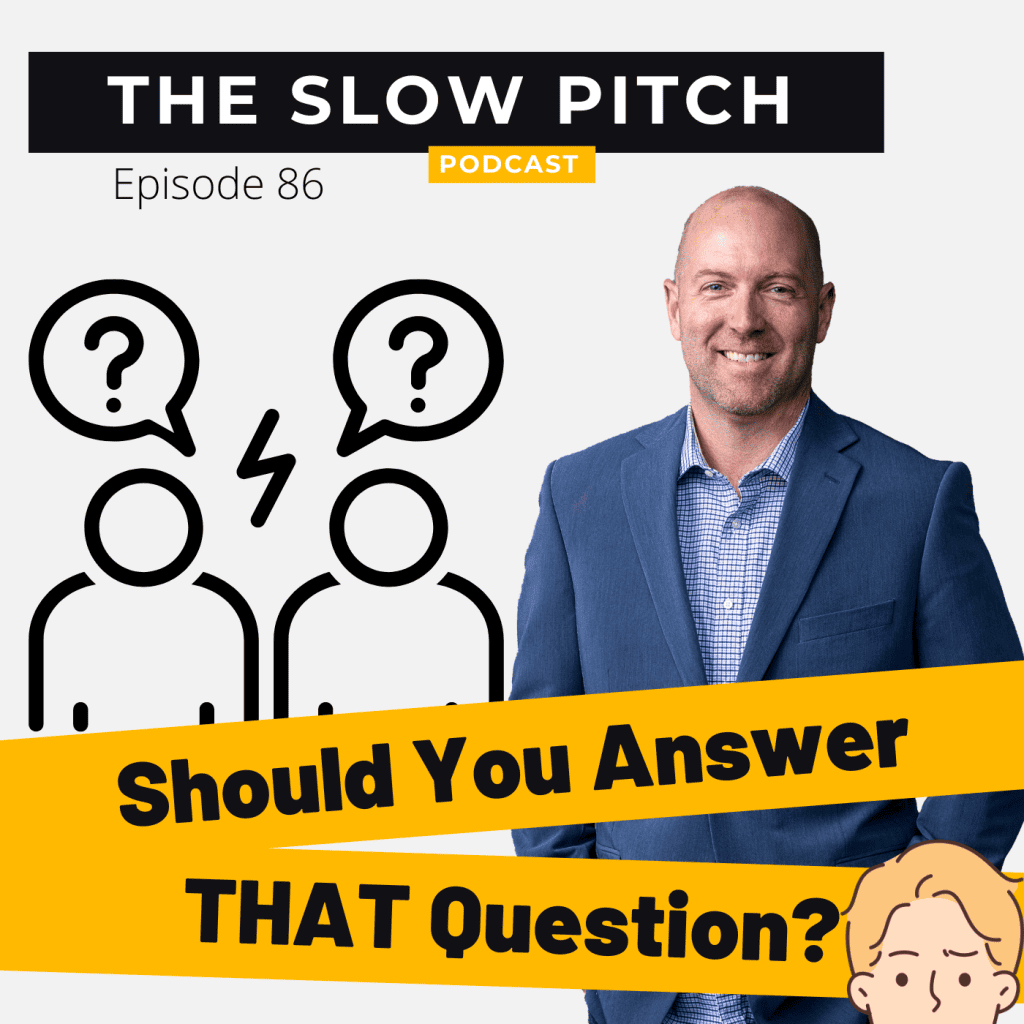Master Challenging Questions


Notes
Should You Answer Challenging Questions?
In sales, the art of mastering challenging questions is not merely a skill but puts you at an advantage that can set you apart in a competitive market. Among these, the questions about pricing or the intrinsic value of services you provide can often be tough to address. Drawing insights from real-world experiences and the artful navigation of sales conversations, this episode equips sales professionals with the knowledge and tactics to turn challenging questions into opportunities for closing more deals and strengthening client relationships.
Understanding the Essence of Challenging Questions
Challenging questions in sales, especially those that probe into the pricing and the value of services, are more than mere requests for information. They are indicative of the client’s skepticism, a test of your credibility, and an opportunity to deepen the client’s understanding and appreciation of your offering. The story shared by Rob on The Slow Pitch Podcast, where he observed a receptionist at a dentist’s office adeptly handling a potential customer’s probing questions, serves as a perfect example of this dynamic in action. The receptionist’s encounter underscores a critical lesson: the importance of responding to challenging questions with questions of your own to uncover the true intent behind the inquiry.
The Strategy of Redirecting with Questions
One of the most effective strategies in dealing with challenging questions about pricing or value is to ask clarifying questions in return. This approach serves several purposes: it gives you time to think, helps you understand the client’s real concerns, and shifts the conversation from a defensive posture to one of mutual exploration. For instance, when faced with the classic question, “Is that the best you can do?” instead of succumbing to frustration or attempting to justify the price outright, asking, “What were you hoping for?” can open a dialogue that may reveal the client’s underlying budget constraints or value perceptions.
Turning Skepticism into Engagement
Challenging questions, particularly those related to cost and value, often stem from the client’s lack of information or misunderstanding about what sets your service apart. By engaging the client with questions that encourage them to articulate their needs and expectations, you not only gain valuable insights into how to serve them better but also steer the conversation towards highlighting the unique benefits and value your service provides. For example, if a client questions why they should choose your service, responding with, “Why did you consider us in the first place?” can lead them to recall and express the qualities or offerings that attracted them to your business, reinforcing their initial positive impression.
The Power of Listening and Empathy
Mastering challenging questions also involves active listening and empathy. Understanding where the client is coming from, acknowledging their concerns, and showing genuine interest in finding a solution that meets their needs can significantly enhance trust and rapport. This empathetic approach can transform potentially adversarial exchanges into collaborative problem-solving sessions, where the client feels valued and understood, paving the way for a more favorable view of your pricing and value proposition.
Practice and Preparation: The Key to Confidence
The ability to master challenging questions in sales does not come overnight but through practice and preparation. Familiarizing yourself with common objections and questions related to pricing and value, and preparing thoughtful, question-based responses can increase your confidence and effectiveness in these critical moments. Role-playing scenarios with colleagues or mentors can also be an invaluable practice tool, helping you refine your technique and approach to various client personas and concerns.
Embracing the Challenge
Ultimately, mastering challenging questions in sales, especially those concerning pricing and value, is about embracing these inquiries as opportunities rather than obstacles. By developing a strategy centered on asking probing questions, actively listening, and empathetically engaging with clients, sales professionals can navigate these conversations with confidence. This not only aids in overcoming skepticism but also builds stronger, trust-based client relationships, laying the foundation for successful and mutually beneficial partnerships. Remember, the goal is not just to answer a question but to deepen the client’s engagement and commitment to your service, turning challenging moments into stepping stones for growth and success.
Keywords: Sales Questions, Answering Questions, Sales Podcast, Challenging, Mastering
Related Content:
How to Find Pain in Sales. What Is Pain in Sales?
5 Tips For Salespeople (pt 4) Pain Questions
Podcast Recorded on Squadcast.fm
NOTE: Some links may be affiliate links, which means we get paid a commission when you purchase, but it the cost remains the same for you.
Music: "Clydesdale Funk" by Cast of Characters, written by: Dustin Ransom.
The Episode
Rob 00:08
Welcome back, everybody to The Slow Pitch. And today I have a story for you that hopefully you can relate to being placed into a position where you need to prove yourself. Have you ever been there where somebody’s like, what can you do for me really? Like, why should you do this work? That’s never a fun position to be in, is it? Let’s figure out how to deal with that issue.
V/O 00:28
You’re listening to The Slow Pitch Podcast, a podcast about selling less and closing more.
Rob 00:35
Before we get started today, I just wanted to read a quick review that we got on Apple podcast that helps me understand whether or not we’re being helpful or not for you. And it also it means a lot for me when somebody does this. So the review basically says, Hey, this is a very helpful podcast for those who are working in sales and trying to improve their own sales skills. In their own business. I found these episodes to be very valuable. So thank you, Elizabeth, for saying that. I really appreciate it.
Rob 01:00
I also had somebody named Kendra, who said this episode is very helpful. I just listened to the cell help people by episode. And it was like a masterclass in psychology behind sales. I loved it, I can’t wait to listen to more. Kendra, again, I thank you for that. And that means a lot to me. And you can really help this podcast out by just leaving a quick review doesn’t take very long, it makes a difference for those that are looking for a podcast, they look at some of those reviews and go okay, this is worthwhile, and make the decision to listen too.
Rob 01:28
I appreciate that. So if I can upfront, ask you to do that in the future. If you’re listening now, we’d love to have you do that.
Rob 01:35
So let me get into the story that I ran into. Not not too long ago, I was at the dentist office, I was getting ready to get my teeth cleaned. You know, basic normal stuff, I wasn’t having a big problem there. And, and I was just sitting there in the in the in the entryway waiting for the receptionist was you know, you could hear her on the phone talking and getting different phone calls and different things.
Rob 01:56
And that dentist office happens to do reconstructive stuff sometimes too, they get into the pulling teeth putting stuff in and, and making things look a little nicer, let’s say lining teeth a little bit better. And I guess what happened was when I was sitting there, I heard this phone call come in. And the receptionist was you could tell was frustrated by the call. And she kept answering questions that she shouldn’t be answering.
Rob 02:19
Now you probably think well, what do I mean by that? Like, she shouldn’t be answered? Well, there are questions that come across kind of like, a little bit negative, they’re trying to trip you up. They’re trying to get you to say something and sell them on why they should come to your office. And I’m sure everybody else has had this at one time or another like, you know, you guys are, you know, been around for a few years. But why should I come to see you?
Rob 02:45
And so basically what she was, I want them sitting there she had somebody asked her the question, well, you know, what’s the price for having this done? And she was like, yeah, we can only you were here, we did look through, here’s what we did, and basically was going to cost you is X and it was a significant amount of money. It was I think, three or $4,000. And yes, insurance came up and all that good stuff. So they kind of talked a little bit about that.
Rob 03:05
But you could tell on the other end that the person had asked, Is that the best you can do. Now? I mean, if you’ve never had that question, I would be surprised in your business. But when somebody says, Is that the best you can do? That’s got to be the most frustrating statement. Anybody can say, right?
Rob 03:20
Well, of course, it’s the best you could do. What do you think I’m going to try to charge you more than I should be? or less than I should be? Like, I don’t understand what that question is, I have to stay competitive. It’s not like as a dentist, right? You’re not going to be trying to charge things that are way out of whack. You got to be competitive, you have insurance pricing that you have to work with, then, of course, it’s the best that they can do. Like what kind of question is that?
Rob 03:43
But you can’t answer that, right? Because that’s the kind of the reaction that you want to give. But that is not the right reaction. Because as soon as you start doing that, what you’re going to do is you’re gonna you’re gonna, you’re gonna let them know that you’re, they’re winning. And now you’re reacting to something that they’re doing and saying, and that’s not, that’s not the way it needs to work.
Rob 04:00
They also asked the question, it seemed like anyway, it was like, Why should I use you? Because the receptionist was basically saying, well, you should use this doctor because and she started listing off all these reasons why he’s really good at what he does. Now, that’s also a question that anybody could get in their business. And I would dare say that anybody that gets either one of these questions should never answer that question. Instead, you should ask them some back.
Rob 04:26
When they ask you the question, Is that the best you can do? The best answer you get back is essentially, what was it that you were hoping that they would tell you? And they might say X number, whatever that number back is? And then your question back again, this is going to be something along the lines of what what happens if I can’t get to that number what you what happens if I can’t do that? What if that’s impossible for me to do? What happens then?
Rob 04:50
What you’re doing is putting them into the position of is this kind of the right question to be asking and sometimes they just let it go and sometimes they move on. But when you ask that question back, it’s really put To get back on them to say, well, this doesn’t make sense. And I don’t know how to answer that question. There’s no way to explain it. This is the way the pricing is right?
Rob 05:08
And when you go to the question of, Why should I use you, there are so many answers you could give. But probably the best answer you could give us, I’m not sure why you should use us, or I don’t know why you should see this doctor, why did you give us a call, instead of a different doctor? Why didn’t you just use that doctor instead of us? Why are you even calling us?
Rob 05:29
What you’ll find is sometimes they are just searching for another alternative price to compare against, maybe they already have a doctor, or they already have a person doing what you’re asking for, and they just need another price. And so by asking that question, you might be able to find out whether or not they’re just looking for another price, or something to compare it to. And that’s not a bad thing.
Rob 05:48
That’s maybe then another conversation where you can say, you know, if you’re just looking for another price, I can get you a different price. That doesn’t bother me. I mean, this is what it is fine. When somebody asks, Why should I use you? I tend to just turn it back and say, I’m not sure why you should use me. Why did why did you call us? I mean, you must have looked us up online, you must have saw something that was interesting, something that was fitting to what you were looking for, what was that? Make them tell you that they’re gonna go through in their head?
Rob 06:15
Now they can’t do that. And they go, Well, I’m just looking for a contact or somebody that does what you do. That’s a different situation, right? They’re just, they’re just looking for somebody to compare their price with. So now you kind of get a feel for that, you might be able to call them over that you might even get a response that says, I was told to call you by X doctor or by another person that’s a friend of theirs or whatever.
Rob 06:36
Then you should follow up with what what did they tell you? Why, why did they tell you they should call you that you should call us? Why did they tell you that? Do you think what why did they tell you us specifically rather than another person, make them explain all of that.
Rob 06:49
When you get into situations where you are asked a question? That’s a little bit difficult to answer, because you don’t know what the reason behind the question is… That’s the time to push back with another question. That’s the time you should be asking them. I’m confused. What are you asking? Or why are you asking that question? Because I’m not sure I understand what you mean by that? Or, you know, what are you hoping I can tell you? What are you looking for? And type of my answer, because I’m not sure I can answer that question very easily.
Rob 07:17
Especially if the question is too soon. By too soon. I mean, you haven’t had enough of a conversation with them to understand what their situation is that you can price it out. If you don’t know those answers to those questions, then how would you be able to give those numbers right, so, there’s nothing wrong with saying that.
Rob 07:32
What it comes down to in the end is being very clear about what questions you are answering back to the person who’s about to buy or wants to buy, and knowing whether or not their questions are legitimate or not. Nine times out of 10. They are usually not valid questions. They’re hoping that they can trip you up and trap you. And you don’t want to be trapped, don’t be trapped.
Rob 07:58
All you have to do is ask questions back, get clarification, and by getting clarification, you’ll start to be able to answer the real question., the question that they really want answered. They can only make that decision. You can’t. Thanks for listening. If this helped you, share it with somebody else who you think might find this valuable. Don’t forget to leave a review if you have a chance. I truly appreciate it. Until next time, slow down and close more.
V/O 08:22
Thank you for listening to The Slow Pitch. Do you have a question about sales? Call or text your question at (608) 708-SLOW. That’s (608) 708-7569. Or you can email them to Questions@TheSlowPitch.com. Slow Down and Close More.
Rob 09:12
Thanks as always, for listening today. If you liked this podcast, please subscribe and leave us a review. We really appreciate it. Follow us on Twitter, Instagram and Facebook at The Slow Pitch. We were mixed today as always by Johnny Polakis. We were produced by High Gravity Studios. Music credits and other notes are in the show notes section on TheSlowPitch.com and we’ll be back with another episode soon.








